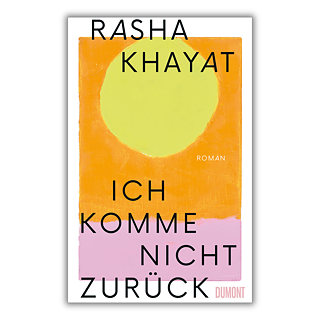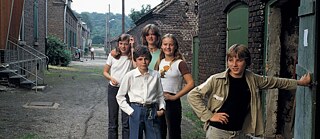How much can a friendship endure when society threatens to tear it apart, when the inequalities seem more important than everything we have experienced together? A novel that gets under your skin with its probing questions.
‘Entire books, entire libraries could be filled with all the unsaid words, the unsaid sentences.’ This sentence appears again and again throughout the book. A book that has a lot to say without having to say much. In Ich komme nicht zurück (I'm Not Coming Back), Rasha Khayat tells the story of the friendship between three people who, after 11 September 2001, realise that some differences outweigh any similarities.

Escape from home, refuge in the family of choice
When the first-person narrator Hanna and her best friend Cem meet Zeyna for the first time, they are on the miniature golf course with their housing estate's holiday programme – ‘for the poor people's children’, as a neighbour calls it. The new girl speaks Arabic, they don't understand her, but the language barrier doesn't stand in the way of their friendship. ‘We couldn't say much to each other in those first weeks and months of our first summer together. We were children, the three of us, we didn't need that many words or sentences.’They soon make it their mission to help Zeyna learn German, not only Hanna and Cem, but also Hanna's grandparents, with whom she has lived since her parents died. They become a second home for Zeyna and her father Nabil. The two have fled Lebanon, their home town, where the war took their house and Zeyna's mother. A loving togetherness develops, a family of choice in which Hanna, Zeyna and Cem carefree enjoy being children, grow into teenagers and never leave each other's side.
Between loneliness and memory
The memories of that time catch up with Hanna. After years of distance, she has moved back to the Ruhr area, her grandparents have both passed away. In their flat, the centre of her past, she asks herself: ‘What is a life worth if no one remembers you (...), if you are the only one bending over photos and thinking – back then.’ Apart from Cem, there is no one left, no parents, no grandparents, her best friend, who was once like a sister, broke up with her years ago.Not even Cem, the last confidant in Hanna's life, knows the reason for this. She is too ashamed of what has happened. And yet her longing for Zeyna grows, haunting her like a ghost – until Hanna can no longer help herself and dares to make her first attempt at contact after years of silence.
‘WE against THEM’
But it is not just this incident that drives Zeyna out of Hanna's life. When the terrorist attack on the World Trade Center shakes the world on 11 September 2001, Zeyna and Cem are increasingly confronted with problems that are alien to Hanna. Zeyna has to give up her job at the hairdressing salon because the customers won't let her touch their hair, and her father's taxi is pelted with dirt and spat on. Cem's Turkish family is also affected – there are constant shouts of ‘Go home, terrorist!’ or ‘We don't want you here!’. Despite everything, the bond of their years together remains – until Hanna's misstep changes everything.In clear, captivating and poetic language, Rasha Khayat takes us through Hanna's emotional world: through guilt and shame, her loneliness, her longing for Zeyna, for a time when the two girls were one, without realising that society would soon be divided – ‘WE versus THEY’ – and that their friendship would not survive this division. And yet we cling with Hanna to the last spark of hope that keeps her reaching for her mobile phone.
Feel instead of explain
Ich komme nicht zurück brings current topics of social importance to the reader's attention, without any lectures or analyses. Whether migration, experiences of discrimination, the concept of the family of choice or the loneliness of young adults in times of uncertainty: Rasha Khayat's novel allows us to sense the humanity and vulnerability behind these big concepts. And leaves us hoping until the very last page that all the unspoken words between the two friends will finally be spoken.November 2024
